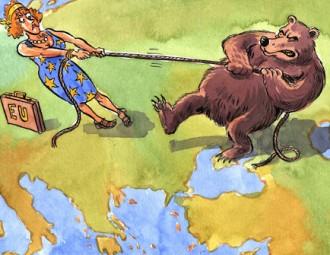The Eurasian tug-of-war

The EU is competing with Russia for the future of its eastern neighbours.
IT IS not much to look at, but the modest yellow-brick building on the outskirts of Vilnius is a beacon of academic freedom shining into dictatorial Belarus. The European Humanities University (EHU) was founded in Minsk after the fall of Soviet communism to promote Western-style teaching of philosophy, history and much else. Aliaksandr Lukashenko, the president, shut it down in 2004. But against the odds, it was reborn in exile across the border in Lithuania.
Belarusian propaganda denounces EHU as a haven for opponents, even “terrorists”. Lecturers and students are periodically harassed by the KGB, particularly around election time. But somehow EHU, with its 1,600 students split between Lithuania and Belarus, survives thanks mostly to support from European countries. Maria Sliaptsova, a second-year law student, wants to return home to work as a human-rights lawyer. But she has no illusion that Mr Lukashenko is about to change; at best, EHU can educate those who will run the country after he leaves power.
Vilnius and Minsk are almost sister cities, sharing much common history. But one is in the EU and the other languishes under Soviet-inspired authoritarianism. Many Lithuanians look at Belarus as a reflection of their former Soviet selves. And as Lithuania this week takes over the rotating presidency of the EU council of ministers, its government is reminding the EU that the task of creating “Europe whole and free” is hardly complete. The troubles of the southern neighbourhood, the Middle East and northern Africa, may grab most foreign-policy attention. But the EU probably has greater influence in its eastern borderlands.
For now Belarus seems a lost cause, unmoved by EU blandishments or sanctions. Perhaps, hope some, it will be induced to change by developments in Ukraine to the south. There Viktor Yanukovich, the president, is trying to play off east against West. If it could be drawn closer to the EU, Ukraine would be a great prize, with its population of 46m as well as big energy and agricultural resources. In Vilnius officials like to quote Zbigniew Brzezinski, a former American national security adviser, who once argued that, for as long as it dominates Ukraine, Russia will remain an empire and cannot be democratic.
Eastern Europeans see a titanic contest between Moscow and Brussels for Ukraine. Yet, having turned inward, most of Brussels is barely aware of it. The decisive moment may come at November’s Vilnius summit between the EU and the six members of the “Eastern Partnership”: three countries bordering the EU (Belarus, Ukraine and Moldova) and three from the Caucasus (Georgia, Armenia and Azerbaijan). Ukraine has negotiated an “association agreement” on political co-operation, including respect for democratic norms and the rule of law. It has also agreed on a “deep and comprehensive” free-trade agreement that would extend a large part of the EU’s body of law eastward. Moldova, Georgia and Armenia are close behind. The hope is that at the summit Ukraine will sign and the three will initial the deals.
The bear-hug
Russia once denounced NATO’s expansion but claimed to accept the extension of the EU to its “near-abroad”. Now Vladimir Putin, the Russian president, seems to regard the EU as hostile. Russia is making a rival offer: a “Eurasian Union” to counter the European one, starting with a customs union that already includes Russia, Belarus and Kazakhstan. The deal would bring cheaper gas and, according to one source, perhaps a big loan for Ukraine.
Senior European visitors to Kyiv say that, for all Ukraine’s thuggish politics and corrupt economy, Mr Yanukovich is leaning towards Europe, though he may not understand quite how much it requires him to change. Germany, in particular, has set a firm demand that he release his arch-rival and former prime minister, Julia Timoshenko, jailed on charges of abuse of office. She has said she favours an EU-Ukraine deal. Some of her allies have already been released. The option is to have her go to Germany for medical treatment.
As a Eurocrat puts it, the Ukrainian president must choose between a rich Russian dinner with lots of vodka and with the risk of discovering that he has been captured and his car stolen; or a boring Brussels sandwich lunch that offers respectability and a solid job, but only in the longer term. The profound reforms demanded by the EU, moreover, risk breaking the very system that put Mr Yanukovich in power.
Lithuanians worry that the EU is being too tough: a vital European interest is now being made hostage to the flawed Ms Timoshenko. What if Mr Yanukovich does not meet the demands made of him? Perhaps the Europeans should sign the agreements anyway, but hold up ratification pending reforms. They have a point, but there is a limit to how much the EU could or should soften.
There is a bigger, unanswered question: will any of the partners become EU members? Lithuania reformed Soviet-era political and economic structures in the belief that in the end it would be welcomed by the European family. In 2003 the countries of the western Balkans were given an unequivocal “European perspective”. A decade on, Croatia has just become the 28th member of the EU. But EU leaders have made no clear commitment to the countries of the ex-Soviet empire. Without this, EU integration may seem like too much pain for too little gain. None of them will be ready to join in the next decade, if ever. Yet European leaders should make clear that they remain committed to the principle, set out in the EU’s treaty, that any European country meeting proper democratic standards is eligible. If leaders made clear that the EU’s border need not be fixed permanently just east of Vilnius, they could do a lot of good, perhaps even in Belarus.
-
03.01
-
07.10
-
22.09
-
17.08
-
12.08
-
30.09








































